Tyler Robinson, a 22-year-old resident of Washington County, Utah, stands accused of the assassination of Charlie Kirk, which took place on September 10, 2025, during a speaking event at Utah Valley University.
Kirk, a 31-year-old nationally recognized free speech advocate and high school/college civic preacher, was brutally gunned down in a crowded campus courtyard. It was a brazen targeted attack that shook the nation to its core.
Robinson, who was arrested after a 33-hour manhunt, faces charges of aggravated murder as well as other related felonies, with prosecutors pursuing the death penalty.
The alleged assailant’s crime, due to its premeditation, public endangerment, and assault on civil discourse itself, is one in which justice arguably demands the ultimate punishment available under the law.
Utah’s capital punishment statute reserves the death penalty for only the worst criminals, i.e., those who commit aggravated murder with a callous disregard for human life.
Robinson’s actions are clearly callous and demonstrate a flagrant disregard for the lives of Kirk, his family, and the attendees of the event.
The evidence shows overwhelmingly that this was not an impulsive act, but rather a calculated killing. It was planned and executed with alarming precision.
Surveillance footage shows the defendant concealing a rifle and approaching the event with intent. He fired a fatal shot at Kirk prior to fleeing.
The county attorney has highlighted the premeditated nature of the attack, noting that Robinson, who was not a student at Utah Valley University, deliberately traveled to the event.
Also noted were his actions afterward, including alleged attempts to both obstruct justice and tamper with witnesses.
To qualify for the death penalty, Utah law requires an aggravating factor of creating a “great risk of death to others.”
Robinson’s alleged crime endangered scores of students, faculty, and attendees who were present at the college campus courtyard.
Adding to the death penalty case is the tragic fact that Kirk’s own children, as well as other children, were present to witness the horror, something that Robinson purportedly knew and yet went forward with his hideous actions.
A university campus is a place that has traditionally been looked upon as a bastion of free speech. Two of the major components of Kirk’s public service mission were to encourage civil discourse and to promote free speech in the corridors of academia.
It is the height of bitter irony that in addition to ending Kirk’s life, there was apparently a desire to extinguish Kirk’s own right to speak, forever.
To allow such an act to go without the application of the appropriate measure of justice serves to embolden others who might take it upon themselves to target individuals, terminate their lives, and irrevocably silence their voices.
Utah’s death penalty process is neither hasty nor arbitrary.
It requires a unanimous jury finding of aggravated murder and aggravating circumstances, followed by a penalty phase that will weigh mitigating factors, such as remorse or mental health issues, against the crime’s severity.
Prosecutors must prove these factors beyond a reasonable doubt during the determination of the guilt phase of the trial.
Based on what is currently known, given the eyewitness accounts, video evidence, and family cooperation, a conviction on aggravated murder seems probable.
Because of Kirk’s status as a high-profile national figure, jurors may be more likely to accept the suitability of the death penalty option.
The strong evidence of aggravating circumstances, such as the public risk and premeditation, favors the use of the full extent of punishment.
Robinson’s lack of remorse was illustrated in his alleged obstruction, among other things, allegedly attempting to convince various individuals to stay silent.
His reported lack of cooperation with the prosecution exhibits a clear lack of contrition.
It is a general principle that the wheels of justice grind slowly, in Utah and elsewhere. Robinson’s case may take years before a trial would actually begin, primarily due to pre-trial motions and competency evaluations.
The state’s process is stringent, with automatic appeals to the Utah Supreme Court as well as potential federal habeas review that may delay a potential execution for years.
Notwithstanding delays and obstacles, the pursuit of justice is, and always will be, worth the wait time.
Those who oppose the death penalty often cite life without parole as a sufficient deterrence.
However, as our society is witnessing in similarly brutal cases, allowing defendants to live out their days in prison, with the lingering possibility of future clemency, sends a message that even the most egregious acts of violence may have future flexibility in alleviating consequences.
The death penalty, in contrast, affirms that some crimes are so grievous, the perpetrators themselves have essentially forfeited the right to remain in society.
For Kirk, his family, and the nation, there is one outcome that appears to surpass all others.
May the laws of our land “Take up the cause of the fatherless” and “plead the case of the widow.” (Isaiah 1:17)
James Hirsen, J.D., M.A., in media psychology, is a New York Times best-selling author, media analyst, and law professor. Visit Newsmax TV Hollywood. Read James Hirsen’s Reports — More Here.
© 2025 Newsmax. All rights reserved.






